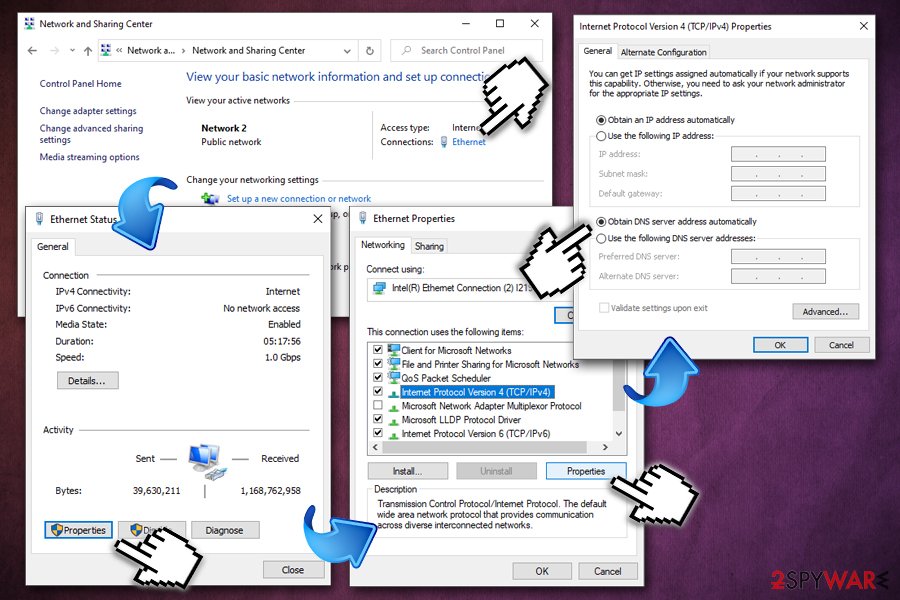Luckysearches.com (Removal Instructions) - updated Jan 2020
Luckysearches.com Removal Guide
What is Luckysearches.com?
Luckysearches.com is a search engine that brings you to legitimate providers but shows additional ads

Luckysearches.com is a search engine powered by DeerNet Technology Co. company, which claims that this search site is capable of selecting the most reliable search results from Bing, Yahoo! and Google. However, users may encounter this site as soon as their web browsers get hijacked by potentially unwanted programs, such as adware[1] or browser hijackers.
In most cases, such installations are not performed deliberately, however, as users are tricked by deceptive third-party software installers that bundle PUPs with freeware apps. As a result, users find Luckysearches.com appended as their homepage, and the settings of Google Chrome, Safari, Mozilla Firefox, or Internet Explorer altered. The customized search engine diverts users' searches to affiliated sites, tracks their online behavior, and displays ads on various sites. Typically, such practices can be terminated with Luckysearches.com removal.
| Name | Luckysearches.com |
| Type | Browser hijacker, adware, potentially unwanted program |
| Associated app | Lucky Searches, or any other potentially unwanted program |
| Bundled with | Simeranya, Unlocker, YourFile Downloader, etc. |
| Developer | DeerNet Technology Co., a Hong Kong-based company |
| Symptoms |
|
| Risks | Installation of other potentially unwanted software, sensitive information disclosure to unknown parties (potentially, cybercriminals) malware infection, etc. |
| Termination | Delete the unwanted software with anti-malware tools that detect PUPs or refer to our manual removal instructions below |
| Optimization | After a computer infection, we recommend scanning it with repair software FortectIntego |
Security experts warn to be very careful when installing freewares and shareware on your computer since Lucky Searches and its clones, such as Quick-Seeker.com, Search.safer.com, TabSent.com and many others, are actively spreading on the internet bundled with other free programs.
Unlike most other browsers hijackers that are relatively harmless and easy to terminate, this PUP possesses some capabilities that are more relevant to malware than a potentially unwanted program. For example, Luckysearches.com is known to also take over some Windows shortcuts (not necessarily internet or browser-related programs) by appending an argument http://www.luckysearches.com/?type=hp&ts=[timestamp]&from=[affiliate_id]&uid=[hard drive id], which causes Luckysearches.com redirects as soon as such icon is double-clicked.
Additionally, this potentially unwanted program modifies DNS settings and takes over your browsing sessions. Therefore, you should not use your browser to perform searches before you remove Luckysearches.com virus from the system. That's because this search provider may return predetermined search results filled with sponsored links and advertisements. Consequently, you may continuously experience Lucky Searches redirects to predetermined third-party websites, which content may be questionable or even unsafe.

Finally, Luckysearches.com's privacy-related issues have to be considered, as well. Owners of this search site claim that it “is strongly committed to protecting the privacy of its community.” However, aren't such statements controversial, keeping in mind that this browser plug-in installs cookies and tracks users itself?
Even though it does not seek to collect personal information, it may accumulate the following information automatically:
- your IP address;
- URL you visit most frequently;
- browser type and language;
- search queries;
- technical details of your device;
- added bookmarks, etc.
In order to maintain efficient search sessions, computer security, and prevent privacy-related issues, get rid of luckysearches.com virus and restore DNS settings. You can find the detailed instructions on how to perform these steps in our removal section below. Additionally, we advise users to scan their machines with anti-malware software, reset all web browsers, and use the PC repair tool FortectIntego for best results.
Browser hijacking programs are usually not installed intentionally
Browser hijackers can easily infiltrate those computers whose users frequently install freeware and do not pay enough attention to the installation process. Various browser plug-ins, toolbars, and extensions that, once installed, appear to be adware or browser hijackers are commonly distributed with the help of various freeware and shareware installers.
Such a distribution method is deceptive and tricks thousands of internet users to install potentially unwanted programs on a daily basis. In order to avoid installing unwanted apps without even realizing that, it's very important to select freeware's download source carefully and pick the correct installation mode.
First of all, avoid downloading programs from third-party installers, such as cnet.com, download.com, softonic.com, and many others, because they promote questionable programs as optional components frequently. Besides, avoid selecting Quick or Recommend installation option because this way, “additional components” such as browser hijackers or adware may be installed by default.
In contrast, opt for Advanced or Custom installation option and carefully look for checkboxes claiming that you agree to set Luckysearches.com as your default homepage and search engine – make sure that you unmark checkmark stating that. Otherwise, it will be automatically installed and will take over your browsing sessions.
Luckysearches.com removal guide
Unfortunately, but Luckysearches.com removal might not be as smooth as one might want it to be. Because the hijacker engages in multiple system modifications and alters DNS settings, browser shortcuts, as well as browser settings, simple program termination will not suffice to stop the unwanted activity. Thus, we first suggest you to revert DNS setting modifications and picking default settings instead. Here's how to do it:
- Type in Control Panel into Windows search and hit Enter
- Go to Network and Internet > View network status and tasks
- Click on your connection, e.g., Ethernet
- At the bottom, pick Properties
- Select Internet protocol Version 4 (TCP/IPv4) and click Properties
- Tick Obtain DNS server address automatically option and then click OK

Now, you should remove Luckysearches.com browser hijacker from your system via the Control Panel, as explained in the instructions below. In some cases, such a process might be unsuccessful, or the app might only reside within the browser (if it is an add-on/extension). Thus, we highly advise you scan your machine with anti-malware software capable of detecting and removing PUPs. Finally, reset all the installed browsers in order to make sure Lucky Searches does not return.
You may remove virus damage with a help of FortectIntego. SpyHunter 5Combo Cleaner and Malwarebytes are recommended to detect potentially unwanted programs and viruses with all their files and registry entries that are related to them.
Getting rid of Luckysearches.com. Follow these steps
Uninstall from Windows
Please follow these instructions to terminate potentially unwanted programs from Windows:
Instructions for Windows 10/8 machines:
- Enter Control Panel into Windows search box and hit Enter or click on the search result.
- Under Programs, select Uninstall a program.

- From the list, find the entry of the suspicious program.
- Right-click on the application and select Uninstall.
- If User Account Control shows up, click Yes.
- Wait till uninstallation process is complete and click OK.

If you are Windows 7/XP user, proceed with the following instructions:
- Click on Windows Start > Control Panel located on the right pane (if you are Windows XP user, click on Add/Remove Programs).
- In Control Panel, select Programs > Uninstall a program.

- Pick the unwanted application by clicking on it once.
- At the top, click Uninstall/Change.
- In the confirmation prompt, pick Yes.
- Click OK once the removal process is finished.
Delete from macOS
macOS users should proceed with the following steps to remove Luckysearches.com hijacker:
Remove items from Applications folder:
- From the menu bar, select Go > Applications.
- In the Applications folder, look for all related entries.
- Click on the app and drag it to Trash (or right-click and pick Move to Trash)

To fully remove an unwanted app, you need to access Application Support, LaunchAgents, and LaunchDaemons folders and delete relevant files:
- Select Go > Go to Folder.
- Enter /Library/Application Support and click Go or press Enter.
- In the Application Support folder, look for any dubious entries and then delete them.
- Now enter /Library/LaunchAgents and /Library/LaunchDaemons folders the same way and terminate all the related .plist files.

Remove from Microsoft Edge
Delete unwanted extensions from MS Edge:
- Select Menu (three horizontal dots at the top-right of the browser window) and pick Extensions.
- From the list, pick the extension and click on the Gear icon.
- Click on Uninstall at the bottom.

Clear cookies and other browser data:
- Click on the Menu (three horizontal dots at the top-right of the browser window) and select Privacy & security.
- Under Clear browsing data, pick Choose what to clear.
- Select everything (apart from passwords, although you might want to include Media licenses as well, if applicable) and click on Clear.

Restore new tab and homepage settings:
- Click the menu icon and choose Settings.
- Then find On startup section.
- Click Disable if you found any suspicious domain.
Reset MS Edge if the above steps did not work:
- Press on Ctrl + Shift + Esc to open Task Manager.
- Click on More details arrow at the bottom of the window.
- Select Details tab.
- Now scroll down and locate every entry with Microsoft Edge name in it. Right-click on each of them and select End Task to stop MS Edge from running.

If this solution failed to help you, you need to use an advanced Edge reset method. Note that you need to backup your data before proceeding.
- Find the following folder on your computer: C:\\Users\\%username%\\AppData\\Local\\Packages\\Microsoft.MicrosoftEdge_8wekyb3d8bbwe.
- Press Ctrl + A on your keyboard to select all folders.
- Right-click on them and pick Delete

- Now right-click on the Start button and pick Windows PowerShell (Admin).
- When the new window opens, copy and paste the following command, and then press Enter:
Get-AppXPackage -AllUsers -Name Microsoft.MicrosoftEdge | Foreach {Add-AppxPackage -DisableDevelopmentMode -Register “$($_.InstallLocation)\\AppXManifest.xml” -Verbose

Instructions for Chromium-based Edge
Delete extensions from MS Edge (Chromium):
- Open Edge and click select Settings > Extensions.
- Delete unwanted extensions by clicking Remove.

Clear cache and site data:
- Click on Menu and go to Settings.
- Select Privacy, search and services.
- Under Clear browsing data, pick Choose what to clear.
- Under Time range, pick All time.
- Select Clear now.

Reset Chromium-based MS Edge:
- Click on Menu and select Settings.
- On the left side, pick Reset settings.
- Select Restore settings to their default values.
- Confirm with Reset.

Remove from Mozilla Firefox (FF)
Remove dangerous extensions:
- Open Mozilla Firefox browser and click on the Menu (three horizontal lines at the top-right of the window).
- Select Add-ons.
- In here, select unwanted plugin and click Remove.

Reset the homepage:
- Click three horizontal lines at the top right corner to open the menu.
- Choose Options.
- Under Home options, enter your preferred site that will open every time you newly open the Mozilla Firefox.
Clear cookies and site data:
- Click Menu and pick Settings.
- Go to Privacy & Security section.
- Scroll down to locate Cookies and Site Data.
- Click on Clear Data…
- Select Cookies and Site Data, as well as Cached Web Content and press Clear.

Reset Mozilla Firefox
If clearing the browser as explained above did not help, reset Mozilla Firefox:
- Open Mozilla Firefox browser and click the Menu.
- Go to Help and then choose Troubleshooting Information.

- Under Give Firefox a tune up section, click on Refresh Firefox…
- Once the pop-up shows up, confirm the action by pressing on Refresh Firefox.

Remove from Google Chrome
Make sure you reset Google Chrome after you eliminate the potentially unwanted program:
Delete malicious extensions from Google Chrome:
- Open Google Chrome, click on the Menu (three vertical dots at the top-right corner) and select More tools > Extensions.
- In the newly opened window, you will see all the installed extensions. Uninstall all the suspicious plugins that might be related to the unwanted program by clicking Remove.

Clear cache and web data from Chrome:
- Click on Menu and pick Settings.
- Under Privacy and security, select Clear browsing data.
- Select Browsing history, Cookies and other site data, as well as Cached images and files.
- Click Clear data.

Change your homepage:
- Click menu and choose Settings.
- Look for a suspicious site in the On startup section.
- Click on Open a specific or set of pages and click on three dots to find the Remove option.
Reset Google Chrome:
If the previous methods did not help you, reset Google Chrome to eliminate all the unwanted components:
- Click on Menu and select Settings.
- In the Settings, scroll down and click Advanced.
- Scroll down and locate Reset and clean up section.
- Now click Restore settings to their original defaults.
- Confirm with Reset settings.

Delete from Safari
Remove unwanted extensions from Safari:
- Click Safari > Preferences…
- In the new window, pick Extensions.
- Select the unwanted extension and select Uninstall.

Clear cookies and other website data from Safari:
- Click Safari > Clear History…
- From the drop-down menu under Clear, pick all history.
- Confirm with Clear History.

Reset Safari if the above-mentioned steps did not help you:
- Click Safari > Preferences…
- Go to Advanced tab.
- Tick the Show Develop menu in menu bar.
- From the menu bar, click Develop, and then select Empty Caches.

After uninstalling this potentially unwanted program (PUP) and fixing each of your web browsers, we recommend you to scan your PC system with a reputable anti-spyware. This will help you to get rid of Luckysearches.com registry traces and will also identify related parasites or possible malware infections on your computer. For that you can use our top-rated malware remover: FortectIntego, SpyHunter 5Combo Cleaner or Malwarebytes.
How to prevent from getting adware
Choose a proper web browser and improve your safety with a VPN tool
Online spying has got momentum in recent years and people are getting more and more interested in how to protect their privacy online. One of the basic means to add a layer of security – choose the most private and secure web browser. Although web browsers can't grant full privacy protection and security, some of them are much better at sandboxing, HTTPS upgrading, active content blocking, tracking blocking, phishing protection, and similar privacy-oriented features. However, if you want true anonymity, we suggest you employ a powerful Private Internet Access VPN – it can encrypt all the traffic that comes and goes out of your computer, preventing tracking completely.
Lost your files? Use data recovery software
While some files located on any computer are replaceable or useless, others can be extremely valuable. Family photos, work documents, school projects – these are types of files that we don't want to lose. Unfortunately, there are many ways how unexpected data loss can occur: power cuts, Blue Screen of Death errors, hardware failures, crypto-malware attack, or even accidental deletion.
To ensure that all the files remain intact, you should prepare regular data backups. You can choose cloud-based or physical copies you could restore from later in case of a disaster. If your backups were lost as well or you never bothered to prepare any, Data Recovery Pro can be your only hope to retrieve your invaluable files.
- ^ Ellen Zhang. What is adware? How it works and how to protect yourself against adware. Digital Guardian. Data protection software company.























